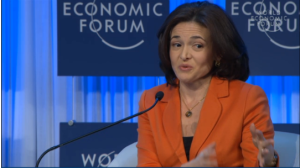Davos is a place where corporate titans, international bankers, world leaders, and a smattering of celebrity do-gooders gather annually for invigorating gabfests about the impact of world developments on their businesses, personal wealth, and collective conscience. And, where politicians, celebrities, and token guests from the Third World change from year to year, the other attendees are invariably the same rich investors and financial managers who represent the world’s super rich.
Despite all their talk about spreading the wealth and sharing the sacrifices of globalization, the agenda for most attendees is to establish contacts that might help them exploit business opportunities.
(“Attendees Emit More CO2 than Solutions at World Economic Forum,” The iPINIONS Journal, January 29, 2007)
The above explains why I have so little regard for the World Economic Forum Annual Meeting at Davos, Switzerland, which ended yesterday.
To the point, though, all one has to do is browse some of my commentaries — with titles like Women Make Better Politicians than Men (October 14, 2010), Lagarde to Replace Strauss-Khan at IMF (June 16, 2011), and Given the Mess Men Have Made of Fighting Wars, Women Can Hardly do Worse (January 26, 2013) — to appreciate my abiding belief (or hope) that the more women participate in such meetings the more newsworthy they would be.
 Therefore, it comes as no surprise that the panel discussion that made the most news at this year’s meeting just happened to be comprised of five women and only one man.
Therefore, it comes as no surprise that the panel discussion that made the most news at this year’s meeting just happened to be comprised of five women and only one man.
Granted, the topic was “boosting women’s role in economic decision making.” So one could be forgiven for thinking that it was every bit the token that the annual panel discussion on economic development in Africa represents – complete with mostly Black speakers.
Except that, where there seems little prospect of Blacks ever leading discussions at the World Economic Forum on any topic other than economic development in Africa, the prospect of women doing so on everything from technology to banking and world economic development is very good.
Which brings me to Sheryl Sandberg’s truly provocative and progressive statements. Sandberg, of course, is the Facebook COO who is generally regarded as one of the most powerful women/people in Silicon Valley.
 Here, in part, is why she made news:
Here, in part, is why she made news:
She called for ‘much more open dialogue about gender,’ including discussing with female employees whether they plan to have children.
‘Every HR department tells you not to do that … but we need to have a much more open conversation…
‘Think of it like a marathon. Everyone’s cheering the men on. The messages for women are different: are you sure you want to run, don’t you want to run, don’t you have kids at home? We have to talk about this.’
As an example of the nervousness around the subject, she cited her own lawyer who had told her she could not publish an article on urging women to ‘lean in’ to their careers – as opposed to pulling back from their work – before starting a family.
‘Then I thought, he works for me,’ she said. ‘If someone wants to sue me because I’m talking about gender discrimination, go ahead.’
(The Telegraph, January 25, 2013)
Hear, hear!
Mind you, women have been leaning in to their careers and, commensurately, men have been leaning in to their families for some time now. The only people who need gender awareness training in this respect are male CEOs who have never had to help with dishes, let alone diapers; or who never had to compete with women in the classroom, let alone the boardroom.
Accordingly, the more women equal (and surpass) the number of men in corporate boardrooms (the way they are equaling and surpassing us in classrooms), the more “natural” it will become for men (including CEOs) to share the burdens and anxieties that come with balancing career and family life.
Related commentaries:
Attendees emit…
Lagarde to replace…